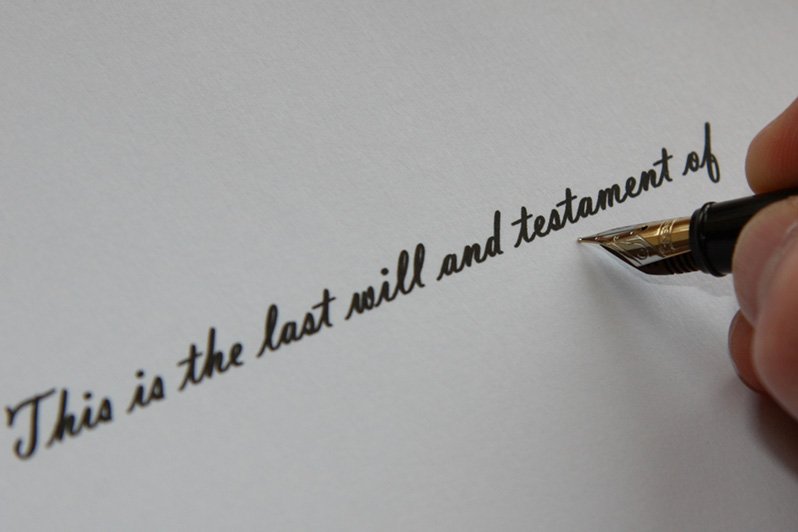Is a Handwritten Will Valid in New Jersey?
A handwritten will, also known as a “holographic will,” may be valid if certain requirements are met. In fact, it may seem that a handwritten will has advantages. For example, a holographic will can be valid even without the witness signatures typically required for probate. However, there are also significant risks and downsides associated with a handwritten will. It is generally in the best interests of everyone from the testator to the personal representative and the beneficiaries to proceed with a traditional will whenever possible.
Posted on January 11, 2018

Validating a Handwritten Will in New Jersey
The key requirement for a handwritten will to be deemed valid in New Jersey is that the signature and key provisions must be written in the same hand, and that handwriting must be identifiable as that of the deceased. While that may sound relatively simple, it typically requires the involvement of handwriting experts and/or witnesses familiar with the deceased’s handwriting.
In some cases, different beneficiaries and potential heirs will have different goals, meaning that warring experts and conflicting testimony by those closest to the deceased may complicate the analysis. In addition, traditional wills are submitted to probate through the Surrogate’s Court, but a handwritten will must be filed in the Superior Court.
These differing legal requirements and evidentiary issues mean that a holographic will can be more expensive and more time-consuming to probate than a traditional will.
Uncertainty Associated with a Holographic Will
Handwritten wills create uncertainty for the testator in two different ways. First, because handwriting analysis is not an exact science, a person drafting a will by hand can’t be certain that the document will be deemed valid. If the will is not found to be valid, distribution of the estate could default to the terms of a prior will, or even be determined by the law of intestate succession.
The added expense associated with the need to prove that the handwritten will is authentic and the possibility of dispute regarding the handwriting also raises the possibility that the estate will be substantially depleted by probate costs. That means the testator’s expectations about the assets available for distribution and the security offered to loved ones may not be met.
Finally, holographic wills are often created without legal advice or a full understanding of the ramifications of certain provisions, procedural requirements, and other factors that may impact the validity of the will or the degree to which the will is interpreted and distribution carried out as the testator would have wished.
Is a Handwritten Will Ever the Right Choice?
Generally speaking, a traditional will provides greater clarity and certainty than a holographic will, and may be significantly less expensive to probate. While a handwritten, do-it-yourself will may be better than nothing—emphasis on “may”—the sensible first choice is to create a traditional will with the assistance of an experienced estate lawyer. A holographic will may be used in an attempt to manage estate affairs if the testator has not properly attended to them during his or her lifetime and no longer has the opportunity to do so.
An extreme but illustrative example would be a person lost at sea, who fears that he will not survive, but expects that the boat will eventually be discovered. If the unfortunate sailor does not have a will, or has a will that differs significantly from his current wishes, he may attempt to draft a valid holographic will as a last resort. For those safely on dry land and not in imminent danger, however, consulting an attorney experienced in drafting wills and trusts is a safer, more certain approach. Save your heirs and beneficiaries time, stress, and money by planning ahead.
More from our blog…
Elder Financial Abuse: How an Elder Law Attorney Can Help
Elder financial abuse is a significant issue affecting many older adults nationwide. It involves someone exploiting or misusing an older person’s finances or assets for [...]
Does Medicare Cover Prescription Weight Loss Drugs?
Americans have a growing appetite for prescription drugs such as Ozempic, Wegovy, and Mounjaro. Originally developed to treat Type 2 diabetes, they are now exploding [...]
How Social Security Overpayment Rules Are Changing
With a new commissioner at the helm, the Social Security Administration (SSA) has been announcing several policy changes in recent weeks. In late March 2024, the [...]
Claiming the Guardianship of an Elderly Parent
Often an aging parent will lose their ability to think clearly or make informed decisions about their life. This may occur because of dementia, mental [...]
Recent blog posts

FREE WEBINAR
5 Things to Know About
Estate Planning
When You Turn Sixty-Five





